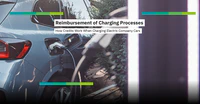When it comes to charging electric company cars, single-family homes are often the first to come to mind. However, tenants in apartment buildings can also benefit from the advantages of electric charging. Many are unaware of the rights and opportunities available to them. This article sheds light on the legal framework and practical aspects of installing charging stations in apartment buildings.
Legal Framework
Since December 1, 2020, tenants in Germany have had a legal right to structural changes that serve the purpose of charging electric vehicles, according to § 554 Paragraph 1 of the German Civil Code (BGB) . Tenants can request the landlord’s consent to install a charging station. The landlord can only refuse this consent in exceptional cases, such as if the structural changes significantly impair the substance of the building or if safety cannot be guaranteed. This opens up new possibilities for conveniently and efficiently charging electric vehicles.
Practical Implementation
An important aspect of the practical implementation of installing charging stations in apartment buildings is how the installation can be concretely carried out. If there is a fixed parking space, a charging station can be installed there. It is important that the installation of the energy meter is done in such a way that only one charging station is connected behind the meter. This ensures that billing is accurate and transparent.

If multiple parties use a charging station, billing can become more complicated. However, modern charging stations often offer the possibility to individualize usage. Each party can use their own access code or RFID card to activate the charging station. This way, the charging time and energy consumption of each party are recorded and billed separately. This method ensures that each party only pays for their own consumption and does not incur unwanted costs for others.
Charging Company Cars at Apartment Buildings
Another important aspect of installing charging stations in apartment buildings is the billing of charging costs for company cars. Charging stations in apartment buildings can also be billed using the Charge Repay Service, a patented procedure by Phoenix Contact . The charging station is set up by the Charge Repay Service so that each charging process is registered as a private charging process by default. Only the company car driver needs to set in the service’s web app that they are now charging for business purposes. This way, no other tenant is restricted, and no one else can charge at the employer’s expense, as only the company car driver has access to the web app. This provides a practical solution for billing charging costs in apartment buildings.
Download our charge@home Guide now!
Our guide highlights the requirements for a home charging solution and explains what is needed to use it for legally compliant billing of company cars. Learn more about the installation of wallboxes, legal frameworks, and efficient billing solutions for home charging.
REQUEST GUIDE
Conclusion
In summary, the installation of charging stations in apartment buildings can offer significant benefits. Tenants have the opportunity to conveniently charge their electric vehicles at home , while clear legal and practical regulations ensure smooth implementation.




